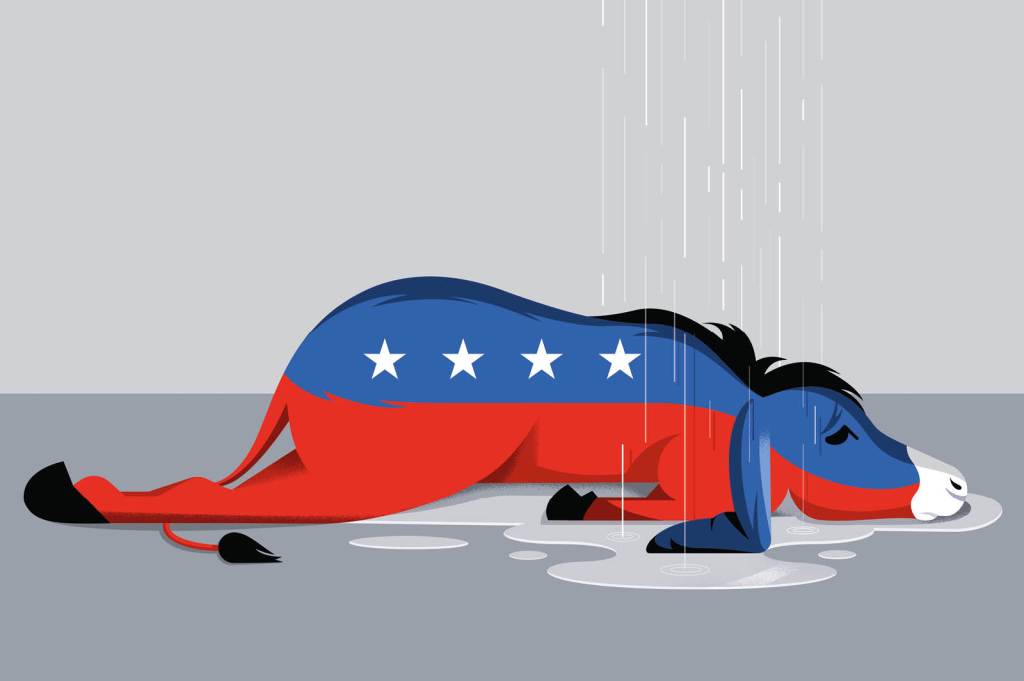My first semester of college coincided with the 2012 presidential contest between Barack Obama and Mitt Romney. I was a conservative from a small rural town at an elite liberal university, and this was not great for my social life. My freshman floormates at Georgetown defaced my political signs, made nasty comments to me in the hallways and on election night my RA dropped by my room to rub it in my face when the race was called for Obama.
The following morning, we all went back to class and started preparing for midterms.
Four years later, universities across the country all but shut down when Donald Trump won the 2016 election. Suddenly the mental health of the losers was priority number one. Classes were canceled to allow students space to grieve. Some schools offered safe spaces, cry rooms, puppy playtime and other means of soothing students who’d discovered that the country was not, in fact, “with her.” The process was repeated this year following Trump’s reelection, with my alma mater implementing a “self-care suite” equipped with hot cocoa, coloring books and therapy guides. Other top universities offered mental-health resources and destressing activities; classes were rescheduled, exam dead- lines extended.
The wailing banshees are hardly confined to the academy. According to Forbes, professional women are experiencing a “wave of high-functioning depression” as many view Trump’s victory as “a symbolic and tangible step backward for gender equity, reproductive rights and workplace equality.”
“This despair is impacting their professional lives in nuanced but powerful ways. Productivity drops, procrastination rises, and interactions with co-workers — particularly those who supported Trump — become fraught with tension or avoidance,” the article continues.
Mental health bookings on Zocdoc rose by 22 percent in just two hours during the morning after the election. Spring Health, a mental health provider, saw a 240 percent jump in appointment bookings the Wednesday after Election Day, reports Fortune. Crisis hotlines saw a similar increase in the volume of calls and texts from distressed Americans.
Why are so many people losing their minds over election outcomes?
The general mental health of Americans is not good. Approximately one in five Americans report suffering from some kind of mental illness, and the problem is even more acute among young people; young adults aged eighteen to twenty-five are more depressed, more anxious and lonelier than any other age group, claims a 2023 Harvard Graduate School of Education survey. Those who are already struggling mentally may not be properly equipped to deal with a political loss.
But that doesn’t explain why hyper-emotional reactions to politics seem to come almost exclusively from the left. We can perhaps thank the mental health gap between conservatives and liberals: 62 percent of white people who classify themselves as “liberal” or “very liberal” report to Pew Research that they have been diagnosed with a mental health condition. Just 26 percent of white conservatives admit the same.
Take a group of unbalanced people, give them a political party and a mainstream media that routinely catastrophizes about the other side winning an election — and you’ll be in for a bad time. Democrats play into liberal fear and psychosis, warning for example that we only have twelve years to reverse the Earth-destroying effects of climate change, that police are hunting black men, that women will have their rights stripped away, that Covid is going to kill them and that Trump is a reincarnated Hitler bent on destroying democracy and killing political opponents.
If you believe these tropes, it’s no wonder you might be a little upset when Orange Man wins. Needing a bubble bath pales in comparison, though, to some of the explosive and even deadly reactions to the election.
In Seattle, a program manager at the spacecraft company Blue Origin became so “overwhelmed” by Trump’s victory that on election night she strangled, bit and butchered her father with an ice ax when he refused to turn off the lights. Corey Burke, who is married to a prominent transgender journalist, Samantha Leigh Allen, reportedly described her rampage as an “act of liberation” to police.
A Minnesota dad who was known among friends and family for his online rants against Trump killed his wife, two sons, ex-partner and himself two days after the election. Anthony Nephew had a history of mental health issues and in July 2024 told police during a wellness check that voices in his head were telling him to murder his family if Trump took power. “He had a med change a few days ago and since then voices have been telling him Trump is going to take over the world and he needs to kill his family to protect them,” an incident report said. Prior to the murder-suicide, Nephew wrote on Facebook that he was “terrified of religious zealots inflicting their misguided beliefs on me and my family” and had visions of being burned at the stake.
Over on TikTok, a new trend known as “MATGA” has women joking — or are they? — about killing men who voted for Trump. MATGA stands for “Make Aqua Tofana Great Again,” and refers to a seventeenth-century poison created in Sicily by Giulia Tofana to help women escape abusive husbands. The combination of deadly nightshade and arsenic allegedly killed up to 600 men. Videos tagged under the trend show women pretending to mix the poison, while others got tattoos to symbolize their support for MATGA.
“Women who can divorce their husbands, I’m gonna need you to do it today. Women who can’t divorce their husbands, look up Aqua Tofana,” said one female TikTokker.
The Harris campaign attempted to rile up liberal women married to men voting Republican. A nonprofit progressive group ran an ad encouraging women to lie to their husbands about who they were voting for, giving the impression that pro-Trump men would be angry or possibly even abuse their wives if they voted for Harris. Reddit has been awash with stories of women leaving their significant others after finding out they went MAGA.
The dangers of this sort of apocalyptic political thinking were laid bare throughout this election cycle with the double attempts on Trump’s life. A shooter nearly took Trump out at a rally in Butler, Pennsylvania, grazing his ear after the president-elect turned his head to look at an immigration chart. A second attempted assassin, Ryan Wesley Routh, camped out in the bushes at Trump’s golf course in West Palm Beach; people who knew Routh cite his “unhealthy” obsession with the war in Ukraine amid fears that Trump would end US funding of their efforts against Russia.
Some argue that liberals are more likely to struggle with mental illness because they have fewer community and family ties that would give purpose to their lives outside of politics. Musa al-Gharbi, a sociologist at Stony Brook University, broke down additional reasons why liberals struggle with their mental health more than conservatives.
“Compared to conservatives, liberals are much more likely to find meaning in their lives through political causes or activism. They tend to follow politics much more closely and participate more in political action. However, following politics closely, and regular engagement on politics, has been shown to adversely affect people’s mental and physiological wellbeing,” he wrote in American Affairs Journal. This problem, he says, only got worse after the “Great Awokening” as liberals became more likely to attribute failures to systemic factors beyond their control, like racism or sexism, giving them a sense of hopelessness and inability to change their situation.
It’s a dangerous cycle. Liberals believe their quality of life is almost entirely dependent on political outcomes, so they make politics the center of their world, which leads to increased rates of anxiety and depression. When they lose — politically or otherwise — their mental health issues are exacerbated even further and then affirmed by a society that has decided all feelings are valid. The “self-care” industry is one of the fastest growing in the US, with annual sales in the tens of billions of dollars. As long as retailers can make a profit and Democrats can leverage unhappiness into votes, we may be in for more to come in 2028 and beyond.
This article was originally published in The Spectator’s January 2025 World edition.


























Leave a Reply